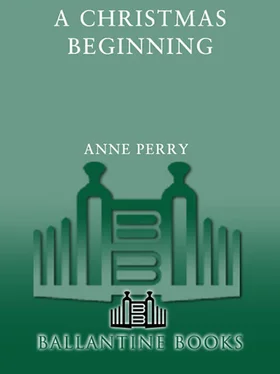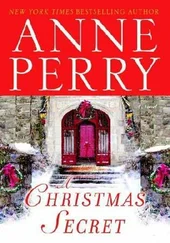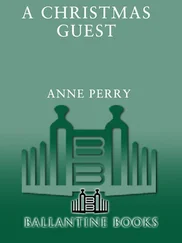
Runcorn had no choice but to see Barclay next. It was an interview he was not looking forward to, but it was unavoidable. Was it really possible that he had lost his temper with Olivia and faced her in the churchyard with a carving knife? Runcorn disliked the man, but he found that difficult to believe. Runcorn didn’t doubt that the man had a hot temper, even that he was capable of delivering a physical blow to another man, but premeditated murder of such bloody violence was beyond even Runcorn’s imagination.
Nevertheless, as he walked up the driveway of the great house, sheltered by laurels, his feet crunching on the gravel, he felt a distinct flutter of fear in the pit of his stomach. He did not imagine for an instant that Barclay would attack him, but even if he did, Runcorn had never been a physical coward. He was tall and powerful, and had fought many battles in the streets of the East End in his earlier years. It was the ugliness of misery and hate that frightened him, the brutality of Melisande learning that her brother was capable of such acts, and then having to face the public shame of it. The scandal would follow her as long as she lived, not from any guilt of hers, but by association.
But if Runcorn were to evade it now, even for her sake, then he betrayed himself, and the principles he believed in and had sworn an oath to uphold. He was a servant of the law and the people, and as he stood on the front step of this beautiful house on the Isle of Anglesey, as if it were a crossroads in the journey of his mind, this was more important than pleasing anyone else. If he foreswore that, then after he had parted from Melisande and left Anglesey, he would have nothing left.
The butler answered the door and invited Runcorn to go into the morning room, saying he would inform Mr. Barclay of his presence.
Runcorn accepted and followed the man’s stiff figure across the parquet floor to the faded, comfortable room facing onto a side garden. A fire was lit and several armchairs were pulled into a ring around it. Two bookcases were filled with volumes that looked as if they had seen much use. A bowl of holly leaves and berries sat on a low table. Runcorn knew it was a house taken only for the season, but it had an air of being lived in with ease and a certain familiarity.
Barclay appeared after nearly quarter of an hour, but he seemed in an agreeable mood and made no objection to Runcorn having called without prior appointment.
“Learn anything yet?” he asked conversationally, coming in and closing the door.
Runcorn found himself relaxing a little. He realized Melisande must have prepared the way for him, at least as much as she could. He should respond with tact, for her sake.
“It appears that Miss Costain was a more complex person than we had at first assumed,” he replied.
Barclay shrugged. “One always wishes to speak well of the dead, particularly when they have died violently, and young. It’s a natural kind of decency, almost like laying flowers.” He did not sit, or invite Runcorn to, so they both remained standing at opposite sides of the fire.
It was Runcorn’s turn to speak. He tried to frame his questions as if he were asking for assistance. “I am trying to find out as much as I can about where everyone was, leading up to the time she was killed. Something must have caused it to happen …”
Barclay’s face registered a quick understanding. “You mean a quarrel, or a discovery, that kind of thing?”
“Exactly.” Runcorn was glad to be able to agree. “Constable Warner has already done a great deal in that line, but I was wondering if you could help any further. You knew Miss Costain. Were you aware of any events that day, anyone she saw, or anyone who was angry or distressed with her?” He was not sure what he expected. For the time being, simply to talk was good. He could move slowly from small facts to larger passions.
Barclay gave it some thought. “She could be a difficult woman,” he said after a while. “A dreamer rather than a realist, if you know what I mean?” He met Runcorn’s eyes. “Some women are a trifle impractical, especially if they have always been cared for by a father or elder brother, and never had to consider the real world. Olivia … Olivia was spoiled. She was charming and generous. She could be an excellent companion. But there was in her a streak of willfulness, a clinging onto childhood dreams and fancies which could become tedious after a while. I felt for Costain.” He gave a slight shrug, as if confiding an understanding better implied than spoken.
“Did they quarrel?” Runcorn asked.
“Oh for heaven’s sake, not to the point where he would take a knife and follow her up to the graveyard and kill her!” Barclay looked appalled. “But I’m sure she tested his patience sorely. It is not an easy thing to be responsible for one’s sister. You have a father’s distress and obligation without a father’s authority.” He spread his hands in a gesture of futility. “I don’t doubt for an instant that he did the best he could, but she was flighty, unrealistic, apparently unaware of her own responsibilities in return.”
He gave a slight smile. “Made me grateful that my own sister is so much more sensible. Faraday will make an excellent husband for her. He has every quality one could desire. He is of fine family, he can provide for her both financially and socially. He is of spotless reputation, good temperament, altogether a thoroughly decent fellow. And fine looking as well, which is hardly necessary, but it is very agreeable. Melisande is a beautiful woman, and could take her pick from quite a few. I’m most grateful that she has more good sense than Olivia had, and does not entertain absurd fancies.” He held Runcorn’s gaze and smiled steadily and coldly.
Runcorn’s head was crowded with an avalanche of thoughts and feelings, bruising him, crushing sense and rational meaning. He struggled to think of something to say that was sensible, purely practical, and would remove that smirk from Barclay’s lips.
“You are right,” the words were thick and clumsy on his tongue. “A sane man does not murder his sister because she is disinclined to marry the suitor he has chosen for her. But have you ever had a suggestion that Costain may not be entirely sane?”
Barclay’s smile vanished. “No, of course not. Olivia could at times try the patience of even a good man, but her brother is beyond reproach. If he were a man less devoted to decency, less governed by the affections of a brother and more of a lover, or would-be lover, then he might be less … sane.” He lifted his shoulders very slightly. “Thank God it is not my trade or my duty to find out who killed her. I cannot think of anything more unsavory than hunting through the sins and griefs of other people’s lives in search of the final depravity, but I appreciate that someone has to do it if we are to have the rule of law. If I can be of assistance to you, then naturally I shall do what I can.”
“Thank you,” Runcorn said bleakly.
Barclay dismissed his thanks with a gesture of his hand, and before Runcorn could frame the next question, he continued. “I would be obliged if you did not harass my sister with this any more than is absolutely necessary. She was fond of Miss Costain. They had certain situations in life in common, and Melisande is a soft-hearted woman, at times a trifle naïve. She was inclined to believe whatever Olivia told her, and I fear it was not always the truth. Olivia was not a good influence.” His smile returned.
“I am glad that Melisande is committed to Faraday, and will soon be settled. Perhaps she would have been able to prevail upon Olivia, had she lived. But that is tragically of no importance any more. If I can think further, I shall certainly inform you.” He turned the corners of his mouth down. “Unpleasant word, inform. Sounds as if it were clandestine, somehow deceitful, but then, to defend someone guilty of such a crime would be even worse, wouldn’t it?” It was half a question, the answer assumed.
Читать дальше











